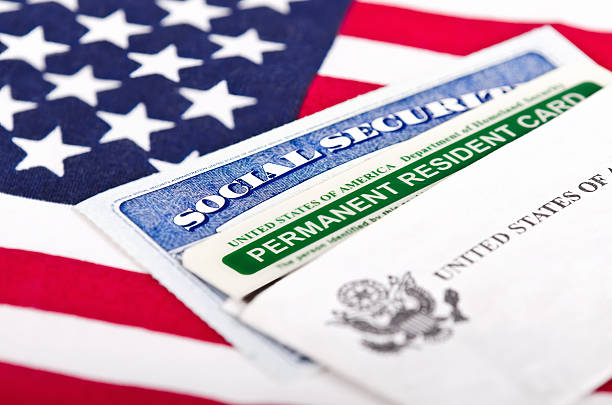Obtaining a Green Card

A Green Card is proof of permanent resident status in the United States and allows immigrants to live, work, and enjoy American life under the protection of the law.
Permanent Residence is a legal status that comes with many benefits, including a pathway to citizenship. Pursuing a life in the United States can be a lengthy process, and the necessary steps and paperwork depend on many factors.
The United States Citizenship and Immigration Services (USCIS) has specialized status categories that determine the process of how immigrants can qualify for a green card. How to achieve legal permanent residence for yourself, a loved one, or an employee will also depend on whether they are outside or already residing in the country, the circumstances of their entry, and any legal infringements while in the United States.
There are countless circumstances that complicate or jeopardize approval for status as a legal permanent resident. The stakes are high when applying for a Green Card, which is why it is crucial to obtain experienced legal counsel when assembling the required forms, fees, and supporting documents.
Immigration Attorney Nassim Arzani Esq. has over 17 years of experience in Immigration and Nationality Law. She has successfully helped thousands of families and individuals enter and remain in the United States legally.
For dedicated assistance obtaining your Green Card, contact Nassim Arzani at (951) 683-0900.
Eligibility To Qualify for a Green Card
Immigrants to the United States can begin their journey to a Green Card by formal sponsorship by a US citizen, a lawful permanent resident family member or an employer. In special circumstances, victims of crime, abuse, asylum seekers, and refugees can petition for themselves. Whether still in their country of origin, or already in the United States, the process begins with successfully obtaining an immigration visa.
Family-Based Immigration
Family immigration law allows a legal resident of the United States to bring loved ones from another country to live in America. Family unification is one of the chief aims of the United States immigration policy and is the most frequently used means to legal residence.
The process of petitioning for a visa may begin before they arrive, and is the first step in obtaining a Green Card. (1)

The person already living in America as a US citizen or legal permanent resident (LPR) is known as the petitioner, since they are actively petitioning for legal residency for their family member. The individual seeking residency is referred to as the beneficiary.
Family-based immigrants, or beneficiaries, are allowed visas as immediate relatives, which includes spouses, children, or parents. The family preference system accommodates other kinds of family members and organizes them into tiered priority categories based on their relationship to the beneficiary. (2)
The petitioner initiates the family-based immigration process by submitting Form I-130 (Petition for Alien Relative) at a USCIS center, along with documents that prove the petitioner’s legal residence status and their relationship to the beneficiary.
The United States does not limit the number of visas granted to immediate family members of U.S. Citizens.
However, immediate relative beneficiaries must meet the standard eligibility criteria, and their petitioners must meet certain age and financial requirements.
Other kinds of family members can also be petitioned for by US Citizens or permanent legal residents. These relatives are called family preference immigrants, and although they and their petitioners must also meet the same requirements as immediate relatives, the annual number of visas for this category is limited. The preference system includes:
- Spouses and unmarried children (minor and adult) of LPRs.
- Adult children (married and unmarried)
- Brothers and sisters of U.S. citizens (petitioner must be at least 21-years-old to petition for a sibling)
These relationships are given categories of preference and levels of priority. Visa caps are determined by the country of origin, preference category, and demand. These beneficiaries may have to wait to be included in the quota and receive a visa. (3)

In order for the beneficiary to qualify for a Green Card, the petitioner must be able to prove that she or he has sufficient financial ability to support the beneficiary. Specifically, the petitioner must earn at least 125% of the Poverty Guidelines in their state, as defined by the Department of Health and Human Services. An Affidavit of Support legally binds the petitioner to support the beneficiary until they either become a US citizen or complete 40 quarters of employment.
LPRs are not eligible for certain social services, so they must be able to prove that they can support themselves financially, and will not become a public charge.
Other Qualifications
The beneficiary must be deemed “admissible” to the United States. This includes a clean bill of health, no history of criminal activity, and no threat of terrorist activity. An immigrant can be declared inadmissible based on prior immigration history, like removals from the US, unlawful presence, fraud, and misrepresentation. There are other additional categories for inadmissibility. If you’re concerned about your admissibility to the United States, consult with an immigration lawyer before beginning your application.
Permanent Employment-Based Immigration
There are over 20 kinds of temporary work visas for non-immigrant workers in the US.
However, an immigrant can be eligible for permanent residence if they are sponsored by an employer. Like the family preference system, permanent employment visas have limited quotas. The skill, education, and potential investment of the worker determine the priority of their preference category tier.(3) A foreign worker does not have to be actively working for the employer in order to be sponsored. Depending on the worker’s legal status, and country of origin, they may be able to obtain a Green Card while continuing to live and work in the United States.(4)
Consular Processing

Beneficiaries who are outside of the United States undergo Consular Processing in order to obtain a visa while in their country of origin. After the petitioner files Form I-130, Petition for Alien Relative, with the USCIS, the case is transferred to the US Department of State’s National Visa Center. Once the beneficiary properly submits fees, forms, and supporting documents to NVC, their case is reviewed. and will be granted an immigrant visa interview. The beneficiary will also require a medical examination by an authorized physician.
If the visa is approved, the beneficiary will be able to travel to the US, and upon being allowed entry by Border and Customs Patrol, will obtain legal resident status. The Green Card is then mailed to the beneficiary. (5)
You can read more about consular processing, and how Nassim Arzani can assist with circumstances that can complicate this process.
Adjustment of Status
Beneficiaries who are already in the United States must apply for a formal adjustment of status before they can receive a Green Card. This converts their status as non-immigrant to permanent status.(6) Their I-130 can be filed at the same time as Form I-485, Application to Register Permanent Residence or Adjust Status. This is known as “concurrent filing.”

Those who have already entered the United States with inspection (having passed through Border Patrol and Customs) are permitted to adjust status if they are eligible for a visa, or if a visa will be available. They are required to undergo a medical examination and vaccinations by a designated civil surgeon and complete the required medical forms. They’ll also need an Employment Authorization Document, and a travel permit, also known as an “advance parole.” This allows them re-entry to the United States should they leave. After filing I-485, beneficiaries will receive a biometrics services appointment. Fingerprints and photographs will be taken to verify the beneficiary’s identity and conduct background and security checks. USCIS may then require that the beneficiary and recipient appear for an interview.
However, every immigrant’s situation and story are unique.
You can learn more about recent cases and policies on her blog.
If the immigrant entered the country without inspection, overstayed a visa, or violated other requirements, there may be additional fees, forms, and consequences. Nassim Arzani Esq. is a Certified Specialist in Immigration & Naturalization Law. She is dedicated to immigration justice and stays current on shifts in US immigration policy.
Special Cases for Green Cards
Many individuals fear seeking legal help because of their immigration status. Nassim Arzani can help immigrants who have survived abuse and instability. There are American legal statutes specifically designed to allow survivors to petition for permanent legal status.
Violence Against Women Act (VAWA)
The VAWA Act serves men, women, and children who have experienced – or are currently experiencing – battery at the hands of their US Citizen or LPR spouse or parent. These individuals can self-petition for a Green Card.
U Visa Application
Victims of other qualifying crimes may qualify for a U Visa if they are willing to assist law enforcement.(7) If granted, U Visa recipients can be granted employment authorization and secure benefits. The U Visa program may provide lawful residency for up to four years, with the eligibility to apply for lawful permanent resident status after three years.
Private Consultations in Riverside, Orange County & Los Angeles
Nassim Arzani has dedicated her career to serving immigrants and delivering justice. As an expert in US immigration law, she wants to hear your story, and help you enjoy a fruitful and productive life in the United States. She gives personalized attention to every case because she understands what is at stake for immigrants and their families. After understanding your unique circumstances, and answering your questions, she’ll explain what your options are, and the best way to move forward. She’ll also be able to give you a reasonable estimate for the cost of your case.
Call (951) 683-0900 to schedule an appointment at our offices in Riverside or Irvine.
Proven Results
You deserve the peace of mind and benefits that come from having a Green Card. Nassim Arzani has a proven track record and has been practicing immigration law since 2003. Our clients deserve the chance at the American dream, and Nassim Arzani, Esq. will advocate passionately to achieve your goal of legal permanent residency. Please visit our reviews page and see just how rewarding working with our firm can be.
References
- 8 CFR §211.1. Visas.
- 8 U.S.C. §1204. Immediate relative and special immigrant visas
- 8 U.S.C. § 1153(b) Allocation of immigrant visas
- American Immigration Council. How the United States Immigration System Works. American Immigration Council. Published January 2, 2019. Accessed February 12, 2021. https://www.americanimmigrationcouncil.org/research/how-united-states-immigration-system-works
- U.S. Department of State – Bureau of Consular Affairs. The Immigrant Visa Process. travel.state.gov. Accessed February 12, 2021. https://travel.state.gov/content/travel/en/us-visas/immigrate/the-immigrant-visa-process/step-1-submit-a-petition/step-2-begin-nvc-processing.html
- INA § 245(a), 8 U.S.C. § 1255(a) Adjustment of status of nonimmigrant to that of person admitted for permanent residence
- INA § 101(a)(15)(U), 8 U.S.C. § 1101(a)(15)(U)

